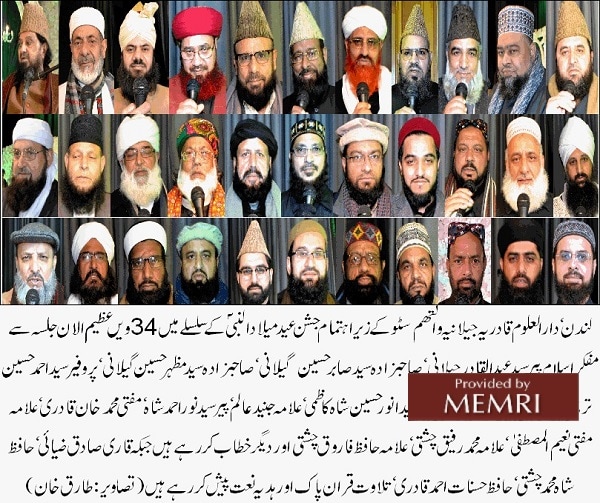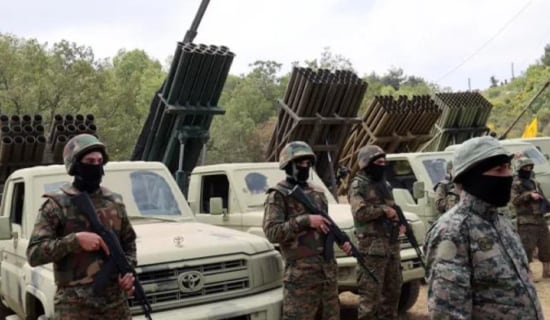
Islamic clerics who addressed the event in Walthamstow, East London, on November 26, 2017.
Introduction
Will the UK become another Pakistan? The definitive answer is yes. The only question is when. In November of 2017, Islamists from the Sufi school of Islam laid siege to Islamabad for three weeks on the issue of Khatm-e-Nabuwwat ("finality of the prophethood of Muhammad"), a belief that is part of Islamic shari'a's blasphemy laws. The ideas articulated by Islamists in Pakistan are being preached in British towns and Europe – publicly and in mass rallies, as discussed below. In an earlier article, I have defined Islam as a movement of ideas, Islamism as the peaceful methodology of Islam and jihadism as the weaponised version of Islamism.[1]
In recent decades, Ahmadi Muslims, pejoratively dismissed by clerics as Qadianis and persecuted by the Pakistani state and society, have found shelter in the UK. Ahmadi Muslims will be at the receiving end of Pakistani Islamism flowing into the UK because they are accused, inaccurately, by Islamists of not believing Muhammad to be the last prophet. Ahmadis do believe that Muhammad was the last prophet, but also argue, much like the Sufis do, that God talks to and mediates with mystics. However, the Islamists – Deobandis or Sufis – have determined that Ahmadis are guilty of blasphemy by not believing in Muhammad to be the last prophet.
Jamaat-e-Islami Official Tells Crowd In Birmingham: "Unless Nizam-e-Mustafa [The Prophet Muhammad's System Of Governance] Is Established... There Cannot Be Peace"
Speaking in Birmingham on November 28, Chaudhary Dawood Pahalwan – the convener of Jamaat-e-Islami UK for the Midlands – "paid generous tributes to those who sacrificed their lives for the honor of the Prophet Muhammad" in the violence that resulted in the three-week siege of Islamabad.[2] Specifically, he was paying tribute to Zohaib Zahid, a leader of Jamaat-e-Islami for the Pakistani town of Rawalpindi, who died in clashes with the police in Islamabad. Chaudhary Dawood Pahalwan also warned: "Unless Nizam-e-Mustafa [the Prophet Muhammad's system of governance] is established in Pakistan, there cannot be peace in the country."[3]
Based in the UK, Chaudhary Dawood Pahalwan and other Islamists advocate Nizam-e-Mustafa, routinely disparage Western secular values, and campaign for shari'a rule. Speaking in the town of Derby, Hafiz Nisar Ahmad, the chairman of Pakistan Rabta Council for Derby, criticized the pro-West politicians in Pakistan and added: "Pakistan's future is tied to the Islam-loving forces. The liberal-secular forces have derived advantage from differences among the religious groups."[4] In the town of Halifax in West Yorkshire, Islamic scholar Muhammad Sajjad Rizvi lauded the wheelchair-bound cleric Khadim Hussain Rizvi for leading the siege of Islamabad.[5] Muhammad Sajjad Rizvi blamed the Pakistani government for the loss of lives in clashes with police, but added: "The sit-in proved how much love the people of Pakistan have for Islam and are ready to sacrifice everything [i.e. their lives] for the finality of the prophethood of Muhammad."[6]
On November 26, at another event in Halifax to mark the birthday of Muhammad, speakers advocated martyrdom to defend the belief in Khatm-e-Nabuwwat, saying: "Islam is the messenger of peace, but to crush the head of the anti-humanity mischiefs also teaches Rasm-e-Shabbiri [martyrdom akin to the one offered by the prophet's grandson at the Battle of Karbala]."[7] In the Islamic conception preached by religious scholars, humanity is Islamic humanity, peace is Islamic peace, brotherhood is Islamic brotherhood, equality is equality between Muslims only. The speakers who addressed the Halifax conference included: Syed Munawwar Husain Shah Jamaati, Syd Ahmed Hussain Shah Tirmizi, Allama Syed Zainul Abidin, Allama Barkat Ahmad Chishti, and others. Tirmizi told the audience: "Khatm-e-Nabuwwat is Islam's foundational and collective faith. Every conspiracy against this will be foiled."[8]
Sufi Mystic Syed Abdul Qadri Shah Jeelani Tells Conference In East London: "For Muslims, This Is An Era Of Trial And Tribulations Because Muslims Have Adopted Modernity"
The November 2017 siege of Islamabad by Islamists emanated from a Pakistani government attempt to change an oath in the country's election law requiring candidates to declare that Muhammad was the last prophet. The attempted legislation was aborted due to fear of Islamists. However, Islamists were not satisfied and, led by Khadim Hussain Rizvi, they marched on Islamabad, forcing law minister Hamid Zahid to resign.[9] In Pakistan, jihadis and Islamists have thrived with tacit and open support of the military. It is not incidental, therefore, that the siege was brought to an end by the Pakistani military, with Maj.-Gen. Faiz Hameed signing the agreement between the Pakistani government and the Islamists led by Khadim Hussain Rizvi.[10] The Islamabad High Court, peeved at the military's role, went on to say that the Pakistani military was behind the siege.[11]
During the three-week siege and thereafter, Islamic clerics based in the UK articulated the same ideas regarding Khatm-e-Nabuwwat and blasphemy laws that have shaped the religious identity of the Pakistani state. Those who support blasphemy laws praise Ashiqaan-e-Rasool ("Lovers Of The Prophet") for killing blasphemers. In Walthamstow, East London, a big event was organized on November 26 by three Islamic groups, which were the International Muslim Movement, Anjuman Khuddam Qadriya Jeelaniya, and Darul Uloom Qadriya Jeelaniya, to mark the birthday of Prophet Muhammad. Leading Islamic clerics from the UK, Europe, and Pakistan, generally from the Sufi/Barelvi school of Islam, attended the event.
Speaking on the occasion, Sufi mystic Syed Abdul Qadri Shah Jeelani said: "The love for the prophet is the only spiritual force that can unite the Muslims of the world."[12] Jeelani, who was the lead speaker, also said: "For Muslims, this is an era of trial and tribulations because Muslims have adopted modernity and distanced themselves from religion."[13] At the event, Qazi Allama Abdul Aziz Chishti, who is from the town of Luton and is the secretary of Jamaat Ahle Sunnat UK and the Overseas Trust, told the audience that it was Jamaat Ahle Sunnat which represented Muslims in the UK and Europe, "whether it be the Rushdie mischief, or the attack by the rejecters of Khatm-e-Nabuwwat, or Europe's attacks against Islam and the founder of Islam [Muhammad]."[14] A resolution was adopted that dubbed those who reject Khatm-e-Nabuwwat as kafirs ("unbelievers").[15]
Islamic Clerics Of Manchester Praise Islamists Who Died In The Siege Of Islamabad: "[We] Pay Tributes To Those Martyrs Who… Drank The Drink Of Martyrdom"
At another meeting in Walthamstow held a few days before this big event, these clerics, in a warning to Ahmadi Muslim community of the UK, declared: "Wherever in the world a voice will be raised for the defense of the prophet's honor and for the protection of the belief in Khatm-e-Nabuwwat... our group, our followers, believers will not hesitate from any sacrifice."[16] The clerics who spoke at this event included: Syed Abdul Qadir Geelani, Qazi Abdul Aziz Chishti, Syed Ahmed Hussain Tirmizi, and others. In a press statement from Birmingham, Muhammad Ghalib, the chairman of the Syed Maududi Foundation, advocated "punishment" for officials and ministers in the Pakistani government who tried to introduce an amendment to the election law on Khatm-e-Nabuwwat.[17]
When the Islamabad siege came to an end, a number of Islamic scholars in the UK lauded Tehreek Labbaik Pakistan Ya Rasool Allah (TLY), the Islamist movement led by Khadim Hussain Rizvi that had steered the siege and was supported by numerous other organizations. In Manchester, these Islamic clerics described Khadim Hussain Rizvi as "Emir-ul-Mujahideen" ("Leader of the Mujahideen") for his "steadfastness and courage," and paid tribute to the protestors who were killed in the fighting with police in these words: "[We] pray for and pay tributes to those martyrs who sacrificed their lives in this great mission and drank the drink of martyrdom..."[18] These clerics from Manchester included: Ahmad Nisar Baig Qadri, Syed Zahid Hussain Shah Rizvi, Mufti Fazal Ahmad Qadri, Hafiz Muhammad Zaheer Ahmad Naqshbandi, Mufti Akhtar Ali Qadri, Hafiz Nisar Ahmad Raza, Muhammad Ahmad Naqshbandi, Syed Hasnain Raza Bukhari, and many others.[19]
Chaudhry Muhammad Altaf Shahid, a Muslim leader based in Manchester, endorsed the Islamist siege of Islamabad on the issue of Khatm-e-Nabuwwat and added: "To play a role for the defense of the prophet's honor is not politics, but prayer."[20] So far, mostly Sufi/Barelvi scholars have taken the lead in celebrating the birthday of Prophet Muhammad. However, a new Deobandi organization, Jamiat Ulema-e-Deoband, was founded this year in Manchester. Dr. Khalid Mahmood, a former justice of the Supreme Court of Pakistan (the Shari'a Appellate Bench), addressed a Koran-teaching session by this group in Jamaa Masjid of Manchester where he declared: "Any such writing or speech which gives the impression that the Prophet Muhammad did not succeed in his mission of prophethood is unacceptable to Muslims."[21] Mosques and other religious institutions in the UK are already divided among various sects of Islam.
Conclusion
Khatm-e-Nabuwwat is one of the beliefs that constitute Islam's blasphemy laws. The speeches and activities of Islamic clerics settled in the UK and coming into the UK from Pakistan and elsewhere reveal only one point: they teach the same Islamist ideas that are taught in Pakistan. With regards to the Prophet Muhammad's honor, all Islamic sects – or the jihadis of Al-Qaeda, the Taliban, and the Islamic State – favor the killing of anyone who commits blasphemy of the prophet. For example, Shia leader Imam Khomeini ordered the beheading of Salman Rushdie for this theological reason. Similarly, Cherif and Said Kouachi, two brothers from Al-Qaeda in the Arabian Peninsula, killed the editors of Charlie Hebdo magazine for this same theological reason. The Islamic clerics in the UK and Pakistan, who are leading the masses to defend Khatm-e-Nabuwwat, belong to the Sufi/Barelvi school. There is absolutely no difference between the beliefs held by the Sufi clerics, Imam Khomeini, and the Kouachi brothers on this theological issue.[22]
* Tufail Ahmad is Senior Fellow for the MEMRI Islamism and Counter-Radicalization Initiative.
[1] See MEMRI Inquiry and Analysis No. 1345, Towards A Definition Of Islam And Islamism, September 8, 2017.
[2] Roznama Ausaf (UK), November 29, 2017.
[3] Roznama Ausaf (UK), November 29, 2017.
[4] Roznama Nai Baat (UK), December 1, 2017.
[5] Roznama Ausaf (UK), December 1, 2017.
[6] Roznama Ausaf (UK), December 1, 2017.
[7] Roznama Ausaf (UK), November 27, 2017.
[8] Roznama Ausaf (UK), November 27, 2017.
[9] See more here, Tehreek Labbaik Ya Rasool Allah (TLY) – The Islamist Movement At The Center Of Anti-Government Protests In Pakistan, MEMRI Special Dispatches Series No. 7199, November 27, 2017.
[10] MEMRI JTTM report Text Of Agreement Between Islamic Clerics And Pakistani Government Mediated By Pakistan Army Reveals Pakistan's Surrender Before Islamists, November 29, 2017.
[11] Roznama Ausaf (UK), November 28, 2017.
[12] Roznama Ausaf (UK), December 1, 2017.
[13]Roznama Ausaf (UK), December 1, 2017.
[14] Roznama Ausaf (UK), December 1, 2017.
[15] Roznama Ausaf (UK), December 1, 2017.
[16] Roznama Ausaf (UK), November 24, 2017.
[17] Roznama Ausaf (UK), November 25, 2017.
[18] Roznama Ausaf (UK), November 28, 2017.
[19] Roznama Ausaf (UK), November 28, 2017.
[20] Roznama Ausaf (UK), November 20, 2017.
[21] Roznama Ausaf (UK), November 20, 2017.
[22] For a discussion of how all schools of Islam advocate beheadings for blasphemy, see Pakistan's Execution Of Malik Mumtaz Qadri – The Ideology Of Blasphemy In Islam, MEMRI Daily Brief No. 86, March 31, 2016.








